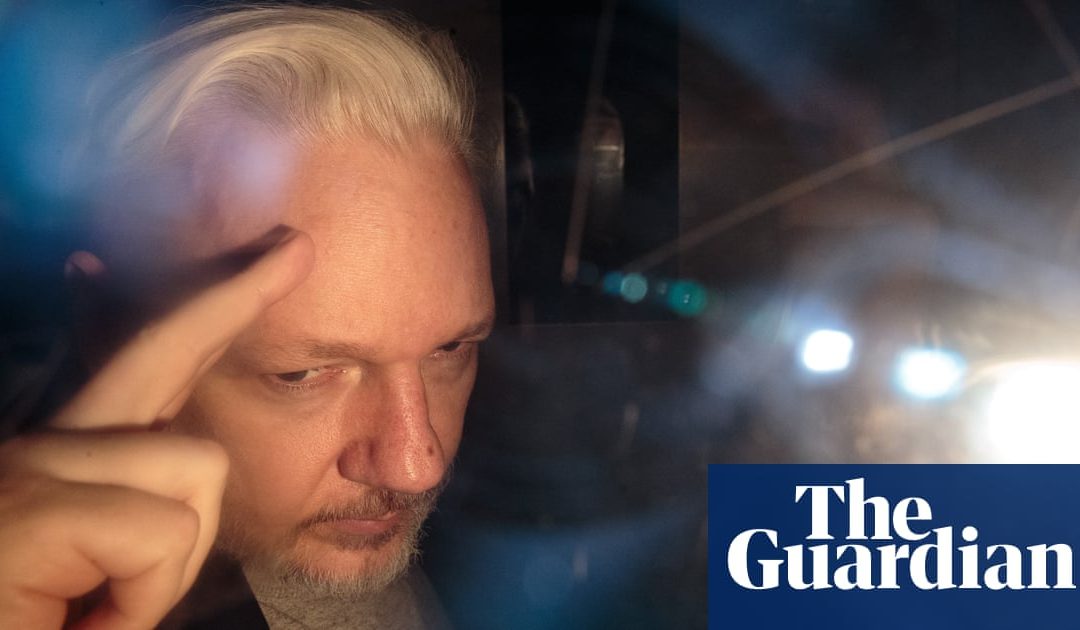WikiLeaks founder declines to consent to being taken to US to face charges

Julian Assange has declined a chance to consent to his extradition to the US at a hearing in London as Washington started pressing its case to take him across the Atlantic.
Appearing via video link from Belmarsh prison, Assange said: I do not wish to surrender myself for extradition for doing journalism that has won many, many awards and protected many, many people.
Ben Brandon, the counsel for the US government, presented details of the US case against Assange at Westminster magistrates court on Thursday. He said the charges related to one of the largest compromises of information in US history.
They were connected to the downloading of a vast amount of classified documents by Chelsea Manning, the US intelligence analyst who subsequently served a prison sentence.
They included approximately 90,000 reports about the war in Afghanistan, 400,000 Iraq war reports and 800,000 Guantnamo Bay detainee assessments, as well as US diplomatic cables.
Assange is being held in appalling conditions in prison, said the editor-in-chief of WikiLeaks, the whistleblowing website the Australian founded, after the hearing. For the last weeks since he was arrested, he has spent 23 out of 24 hours a day in his cell most of the time, said Kristinn Hrafnsson, who blamed austerity and cutbacks.
That is what we call in general terms solitary confinement. That applies to most of the prisoners in that appalling facility. It is unacceptable that a publisher is spending time in that prison, he said.
Referring to a March 2018 indictment against Assange which was unsealed last month in the US court for the eastern district of Virginia Brandon said details of communications between Manning and Assange demonstrated he had agreed to help Manning with cracking a password protecting US Department of Defense computers.
In the brief hearing in London, the judge, Michael Snow, told Assange he could consent to his surrender to the US.
Timeline
Julian Assange in the Ecuadorian embassy
WikiLeaks releases about 470,000 classified military documents concerning American diplomacy and the wars in Afghanistan and Iraq. It later releases a further tranche of more than 250,000 classified US diplomatic cables.
A Swedish prosecutor issues a European arrest warrant for Assange over sexual assault allegations involving two Swedish women. Assange denies the claims.
He turns himself in to police in London and is placed in custody. He is later released on bail and calls the Swedish allegations a smear campaign.
A British judge rules that Assange can be extradited to Sweden. Assange fears Sweden will hand him over to US authorities who could prosecute him.
He takes refuge in the Ecuadorian embassy in London. He requests, and is later granted, political asylum.
The UN Working Group on Arbitrary Detention says Assange has been ‘arbitrarily detained’ and should be able to claim compensation from Britain and Sweden. Britain and Sweden rebuff the non-binding ruling.
Assangeis questionedin a two-day interview over the allegations at the Ecuadorian embassy by Swedish authorities.
WikiLeaks says Assange could travel to the United States to face investigation if his rights are ‘guaranteed’. It comes after one of the site’s main sources of leaked documents, Chelsea Manning, is given clemency.
Nigel Farage is spotted visiting the Ecuadorian embassy.
Swedish prosecutors say they have closed their seven-year sex assault investigation into Assange. British police say they would still arrest him if he leaves the embassy as he breached the terms of his bail in 2012.
Britain refuses Ecuador’s request to accord Assange diplomatic status, which would allow him to leave the embassy without being arrested.
He loses a bid to have his British arrest warrant cancelled on health grounds.
Ecuador cuts off Assange’s internet access alleging he broke an agreement on interfering in other countries’ affairs.
US prosecutors inadvertently disclose the existence of a sealed indictment against Assange.
Ecuador’s President Lenin Moreno says Assange has ‘repeatedly violated’ the conditions of his asylum at the embassy.
Police arrest Assange at the embassy after his asylum was withdrawn. Scotland Yard confirmed that Assange was arrested on behalf of the US after receiving a request for his extradition. Assange has been charged by the US with ‘a federal charge of conspiracy to commit computer intrusion for agreeing to break a password to a classified U.S. government computer.’
He is jailed for 50 weeksin the UK for breaching his bail conditions back in 2012. An apology letter from Assange is read out in court, but the judge rules that he had engaged in a deliberate attempt to evade justice.
Consenting meant he would lose his right to appeal, but the advantage was that it would expedite matters and could lead to an early resolution of his case, Snow said. Assange, who appeared wearing a black jacket and T-shirt, declined.
The US charge against him carries a maximum five-year prison sentence, but supporters are concerned further, more serious charges could be added later.
Snow told Assange the next hearing where something of substance would happen would be 12 June because, by then, Assange would have received all paperwork from the US after a formal extradition request was served. But he suspected it would take many months before the full substance of Assanges case was heard.
Assange was jailed on Wednesday for just under a year for breaching bail conditions to avoid being extradited to Sweden. He took refuge in the Ecuadorian embassy in London in 2012 to avoid extradition over sexual assault allegations, which he denies, but was arrested last month after his asylum was revoked.
Assange supporters at Westminster magistrates court included a contingent of French gilets jaunes (yellow vests) protesters and Lauri Love, a Briton who successfully resisted a US attempt to extradite him for allegedly breaking into government websites.
Julian may have a different mental constitution to me, but in my experience, [facing the threat of extradition] was harrowing, said Love, who added he was optimistic because of what he said was vast public support.
He added: If this extradition is successful and Julian is punished vindictively by the United States, it will be because of publications that were made in the public interest that shed light on atrocities and war crimes, and it will exert a chilling effect on the press.


Recent Comments